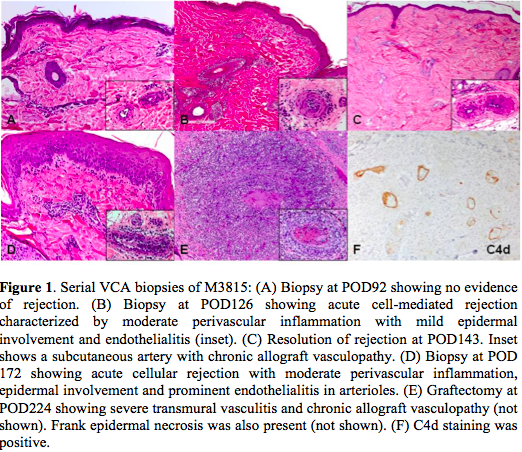Delayed Tolerance Induction Protocol for Vascularized Composite Allografts in Non-Human Primates: The Immunomodulatory Effect of Donor Bone Marrow Transplantation Does Not Prevent the Development of Chronic Rejection in the Absence of Durable Mixed Chimerism.
Massachusetts General Hospital, Boston, MA
Meeting: 2017 American Transplant Congress
Abstract number: 99
Keywords: Alloantibodies, Engraftment, Graft failure, Skin transplantation
Session Information
Session Time: 2:30pm-4:00pm
 Presentation Time: 3:06pm-3:18pm
Presentation Time: 3:06pm-3:18pm
Location: E270
PURPOSE: Donor bone marrow transplantation (DBMT) has been investigated in experimental and clinical vascularized composite allotransplantation (VCA). With longer-term follow-up, reports of chronic VCA rejection have emerged. We investigated the immunomodulatory effect of DBMT on chronic VCA rejection in non-human primates (NHPs).
METHODS: Following VCA and maintenance on conventional immunosuppression (IS) for 2 months, DBMT was performed in MHC-mismatched NHPs (n=6) after non-myeloablative recipient conditioning. A 4-week course of calcineurin inhibition (CNI) was then given before IS withdrawal and assessment for VCA tolerance. Observed rejection episodes were biopsied, treated with CNI and a tapering course of steroids before complete withdrawal after 2 weeks. Systemic immune function was assessed with CFSE-MLR; allo-antibody and chimerism detection was based on flow cytometry.
RESULTS: In the absence of durable mixed chimerism, DBMT allowed IS-free survival for 4-5 weeks before Banff II acute rejection developed (POD115-126). While rejection could be treated and reversed both clinically and histologically, following re-withdrawal of IS, Banff II rejection recurred within 2 weeks (POD172). Despite treatment, rejection could not be reversed (Banff II, POD195) and ultimately culminated in VCA necrosis (POD224). Final histology showed severe ACR and AMR with C4d deposition in subcutaneous arteries and arterioles and chronic vasculopathy (Figure 1). Corresponding serial MLR demonstrated donor-unresponsiveness after DBMT and absence of allo-antibodies.
CONCLUSIONS: While DBMT demonstrated systemic immunomodulation based on MLR, in the absence of durable mixed chimerism, acute and ultimately chronic rejection could not be averted. The presence of vascular lesions (based on C4d deposition) following DBMT may predate clinical progression to eventual chronic rejection and represent a potential prognostic factor in clinical VCA.
CITATION INFORMATION: Ng Z, Lellouch A, Gama A.-R, Schol I, Rosales I, Colvin R, Geoghegan L, Kurtz J, Cetrulo C. Delayed Tolerance Induction Protocol for Vascularized Composite Allografts in Non-Human Primates: The Immunomodulatory Effect of Donor Bone Marrow Transplantation Does Not Prevent the Development of Chronic Rejection in the Absence of Durable Mixed Chimerism. Am J Transplant. 2017;17 (suppl 3).
To cite this abstract in AMA style:
Ng Z, Lellouch A, Gama A-R, Schol I, Rosales I, Colvin R, Geoghegan L, Kurtz J, Cetrulo C. Delayed Tolerance Induction Protocol for Vascularized Composite Allografts in Non-Human Primates: The Immunomodulatory Effect of Donor Bone Marrow Transplantation Does Not Prevent the Development of Chronic Rejection in the Absence of Durable Mixed Chimerism. [abstract]. Am J Transplant. 2017; 17 (suppl 3). https://atcmeetingabstracts.com/abstract/delayed-tolerance-induction-protocol-for-vascularized-composite-allografts-in-non-human-primates-the-immunomodulatory-effect-of-donor-bone-marrow-transplantation-does-not-prevent-the-development-of-c/. Accessed March 3, 2026.« Back to 2017 American Transplant Congress
